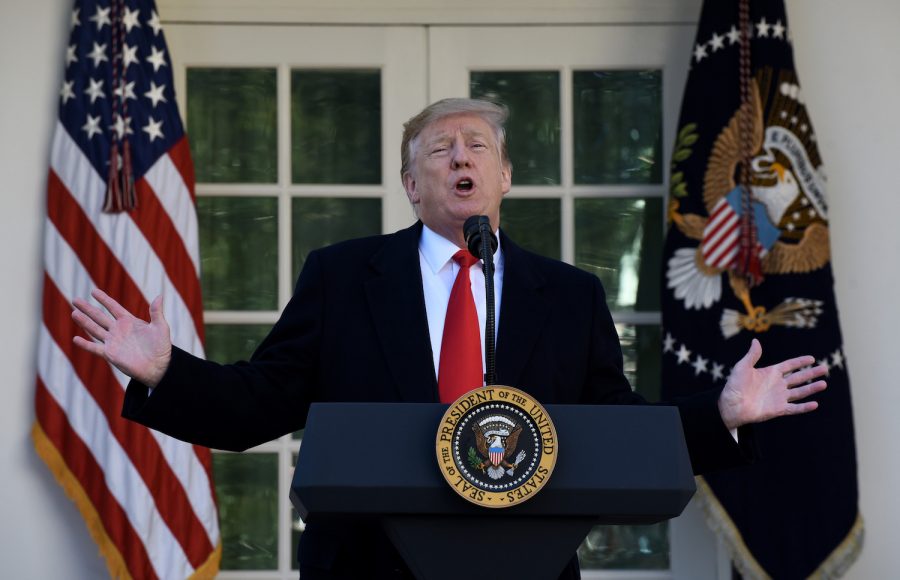Trump agrees to end government shutdown without any border wall money
Olivier Douliery/Abaca Press/TNS
President Donald Trump makes a statement announcing that a deal has been reached to reopen the government through Feb. 15 during an event in the Rose Garden of the White House Jan. 25, 2019 in Washington, D.C.
January 25, 2019
By Jennifer Haberkorn and Noah Bierman
Los Angeles Times
WASHINGTON — President Donald Trump on Friday announced a deal to temporarily end the longest government shutdown in U.S. history, capitulating — for now —on his demand for billions of taxpayer dollars to build a southern border wall.
A day after the Senate defeated competing proposals to reopen the government and as the financial pain from the shutdown spread across the nation, Trump on Friday said it was time to end a standoff he had defended only a day earlier.
The deal includes a three-week extension of government funding through Feb. 15 and an agreement to continue negotiations on border security, including the debate over the wall. Federal workers will receive back pay for the time they were furloughed.
“I will make sure all employees receive their back pay very quickly — or as soon as possible,” Trump said during a White House Rose Garden appearance.
The agreement — which largely mirrors what Democrats have been suggesting — came as three major East Coast airports reported slowdowns Friday because of unpaid air traffic controllers calling in sick.
Trump instigated the shutdown, which began Dec. 22, by refusing to sign any government spending bills unless he received $5.7 billion for a wall.
More than 800,000 federal workers were scheduled to miss their second paycheck since the shutdown began.
Most public opinion polls increasingly put the blame for the shutdown squarely on Trump, who boasted before it began that he would happily accept full responsibility because he believed building a wall was vital to protecting the U.S.-Mexico border.
Democrats accused Trump of holding the government “hostage” to fulfill his major campaign promise. They said border security can be enhanced without a wall.
According to a senior administration official, word rippled through the White House complex Friday morning that “something was shaking.”
The realization that it was time to reopen the government, despite not having achieved any of the president’s desired funding for a border wall, came as the result of new pressures as the shutdown’s effect became more deeply felt.
“Friday is payday,” said the official, who also pointed to the delays at major airports and similar issues at the IRS, where employees assigned to process refund checks were not reporting for work.
Trump’s about-face came just a day after the White House said that any temporary funding measure must also come with a “large down payment” on the wall.
“It is sad that it took 35 days of inflicting pain and misery on Americans for President Trump and Republicans to come to their senses and agree to this solution, but it is better late than never,” said Rep. Nita Lowey, D-N.Y.
Republicans said Trump’s concession reflected his concern for Americans.
“This is a good-faith gesture by the president to say that he’s interested in actually getting this done, that he recognizes the hardship this has been on people,” said Sen. David Perdue, R-Ga.
Serious negotiations to end the shutdown began Thursday afternoon, shortly after the Senate voted down the two partisan bills.
Senate Majority Leader Mitch McConnell of Kentucky met with Minority Leader Charles E. Schumer of New York after the votes, according to a Democratic aide familiar with the talks.
McConnell first offered a short-term funding bill in exchange for some border wall money. Schumer said Democrats would not support wall funding. Schumer countered with a short-term spending bill and plan to discuss border security in a Senate-House conference. House Speaker Nancy Pelosi, D-Calif., also agreed to the approach, the aide said.
McConnell said he would take the agreement to the president.
The Senate could approve the deal as soon as Friday afternoon, although it is unclear whether it would be approved by a voice vote or members would cast votes. The House would have to act next and leaders could reach agreement to move the legislation through the lower chamber within hours. If all goes as planned, the government could reopen as soon as Monday.
There is no assurance that the deal won’t result in another government shutdown when the new funding measure expires, a point that worries some lawmakers.
“We just have to operate in good faith,” said Sen, Debbie Stabenow, D-Mich.
Trump said that if Congress does not authorize wall funding, he will pursue other options, including possibly declaring a national emergency. The administration has said such a declaration would allow him to divert other government funds for wall construction by the military. Democrats and legal experts have questioned whether the president has that authority.
___
(Staff writers Eli Stokols and Sarah D. Wire contributed to this report.)
___
(c)2019 Los Angeles Times
Visit the Los Angeles Times at www.latimes.com
Distributed by Tribune Content Agency, LLC.



